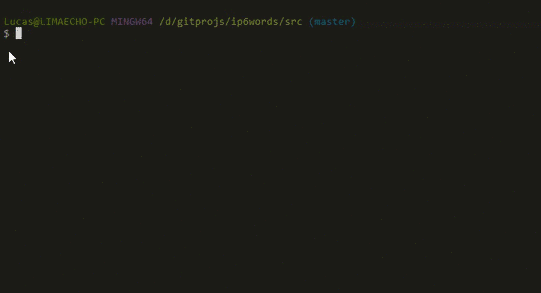Converts IPv6 addresses to and from a user friendly format using words.
# Script entry point "ip6words" can be used instead of manually launching the script through python if the package was installed.
$ ip6words ::
the8
$ ip6words -h
Usage:
python ip6words.py ([-h] | [-d] | [-u] | [-e]) (<ip6words-address-to-convert> | <ipv6-to-convert>)
[-h] ~ This dialog
[-u] ~ The usage dialog
[-d] ~ Delete the dilled (pickled) word list in order to regenerate it before executing
[-e] ~ Explode the results instead of compressing thempip install ip6words- Python 3.3+ (NOT tested at all on Python 2)
- nltk (will download these packages on first run that doesn't use dill, download them yourself beforehand if you'd like to choose the download directory)
- words - optional ~ see note #3
- brown - optional ~ see note #3
- abc - optional ~ see note #3
- inaugural - optional ~ see note #3
- genesis - optional ~ see note #3
- dill
- This is designed to have the same words always point to the same IP and vice versa. The only thing that would alter this would be a change in the base nltk data, causing a shift in the frequency of words.
- Included with this tool is a dilled (or pickled) word list. If you wish to re-generate that dill you must delete the file or run using the [-d] argument.
- In practice, this means you will actually never have to download the nltk packages yourself if you never use the [-d] argument and thus always load the wordlist from the dill.

